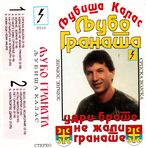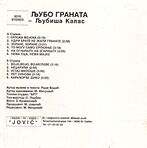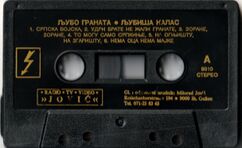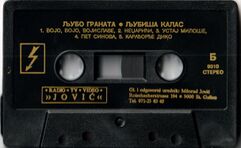Ljubo Granata: Difference between revisions
(Re-worded portions. Technically the "released [date], by [company]" is correct and wiki uses it. We're a db, so we gotta be at least kinda reputable in our wording. Corrected albumby lol. Try to omit any "unfortunately"s or anything that kinda makes it sound conversational/personal (mechanical writing ftw). "all unknown RTVJ editions..." was condensed since why use many word when few word do trick? Also where is Switzerlans? I think I needed to do something else but I forgot.) |
Generacide (talk | contribs) m (Slight rewording, and corrected a "was was" error. There are more things I'd like to improve on the page, but I don't think I have the information to properly reword it.) |
||
| Line 19: | Line 19: | ||
== Background== | == Background== | ||
''Ljubo Granata''<nowiki/>'s contents, while still patriotic in nature, | ''Ljubo Granata''<nowiki/>'s contents, while still patriotic in nature, would have darker themes compared to other albums made in its time. This would be the third time Kalas would work with lyricist Rade Vidić with the first being 1990's ''[[Ljubiša Kalas (Album)|Ljubiša Kalas]]'' and the second being 1991's ''[[Crna žena]]''. As a result, Kalas would sing "Karađorđe diko", a song performed by [[Vojslav Tintor]] two years prior<ref>[https://www.youtube.com/watch?v=r2jsXTWx9MY Vojislav Vojo Tintor Karadjordje, diko Audio 1991 HD]. Српска Архива. 28 September 2018. Retrieved 4 October 2023.</ref>, written by Vidić. The song, "Nema oca, nema majke" was originally from ''Ljubiša Kalas,'' originally titled "Nema oca da pokosi travu"<ref>[https://www.youtube.com/watch?v=bDPy5c7jcWQ Ljubisa Kalas - Nema oca da pokosi travu - (Audio 1990)]. Diskos Official. 31 August 2018. Retrieved 4 October 2023.</ref>. It was included to fit the theming of the album, though the arranger would be left uncredited and its length noticeably absent on the j-card. The song, "Zorane, Zorane" would be about Zoran Borovina, a commander who was killed in action a year prior. | ||
While the significance of "Ljubo Granata" is unknown, it is assumed that it was either for promotional purposes, a name given to Kalas during the war, or acknowledging authorship of "Udri brate ne žali granate" where its size and placement on the cover implies that it was most well-known song on the album. | |||
==Release== | ==Release== | ||
Revision as of 15:41, 24 October 2023
| Љубо Граната | ||||
|---|---|---|---|---|
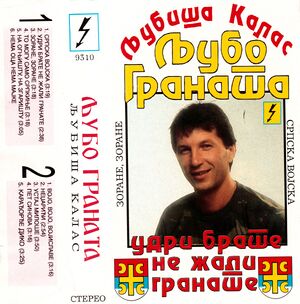 RTVJ release | ||||
| Studio album by | ||||
| Released | 1993 | |||
| Genre | Novokompovana | |||
| Length | 32:29 | |||
| Label | Master | |||
| Producer | М. Јовичић | |||
| Љубиша Калас chronology | ||||
| ||||
Ljubo Granata (Serbian Cyrillic: Љубо Граната), commonly referred to as Udri brate ne žali granate, is the fourth studio album and first war-related album by singer Ljubiša Kalas, released some time in 1993, by the Master and RTVJ. While not much is known on the album's development, this is the only documented occasion where "Ljubo Granata" was used to refer to Kalas.
Background
Ljubo Granata's contents, while still patriotic in nature, would have darker themes compared to other albums made in its time. This would be the third time Kalas would work with lyricist Rade Vidić with the first being 1990's Ljubiša Kalas and the second being 1991's Crna žena. As a result, Kalas would sing "Karađorđe diko", a song performed by Vojslav Tintor two years prior[1], written by Vidić. The song, "Nema oca, nema majke" was originally from Ljubiša Kalas, originally titled "Nema oca da pokosi travu"[2]. It was included to fit the theming of the album, though the arranger would be left uncredited and its length noticeably absent on the j-card. The song, "Zorane, Zorane" would be about Zoran Borovina, a commander who was killed in action a year prior.
While the significance of "Ljubo Granata" is unknown, it is assumed that it was either for promotional purposes, a name given to Kalas during the war, or acknowledging authorship of "Udri brate ne žali granate" where its size and placement on the cover implies that it was most well-known song on the album.
Release
Ljubo Granata was released some time in 1993 by the Master Music Company in both Yugoslavia and Germany. RTVJ would release the album in Switzerland, though this version would have the final track "Karađorđe diko" fade out prematurely.
Due to overlapping staff (mainly engineer Sead Lorbek and the arranger Miki Mitrović) and Master typically acquiring albums from other companies, it is speculated that Jugohit was the original distributor of the album, though there has been nothing to substantiate the claim.
The song "Udri brate ne žali granate" would receive radio play and in present day, "Zorane, Zorane" would have a cult following as it is one of two surviving songs about Commander Zoran Borovina. With Master and RTVJ defunct and surviving uploads and a scan in low quality, it is assumed that master of the album, as well as other works published by Master are lost. On Christmas Day, 2022, user RandomAtribute20k would upload the album in better quality, though the last track would not be uploaded in full since the Swiss version was used.
Track listing
| No. | Title | Length |
|---|---|---|
| 1. | "Српска војска" | 3:19 |
| 2. | "Удри брате не жали гранате" | 2:38 |
| 3. | "Зоране, Зоране" | 3:18 |
| 4. | "То могу само српкиње" | 3:18 |
| 5. | "На огњишту, на згаришту" | 3:05 |
| 6. | "Нема оца, нема мајке" |
| No. | Title | Length |
|---|---|---|
| 1. | "Војо, Војо, Војиславе" | 3:16 |
| 2. | "Неџарићи" | 2:54 |
| 3. | "Устај Милоше" | 3:50 |
| 4. | "Пет синова" | 3:16 |
| 5. | "Карађорђе дико" | 3:35 |
| Total length: | 32:29 | |
- Time for "Nema oca, nema majke" is not listed
- Time for songs are slightly shorter than what is listed on the j-card.
Personnel
Writing
- Раде Видић - Аутор музика и текста
- М. Митровић - Аутор аранжмана
Production
- "АРТ"-Тонкси студио
- С. Лорбек- Тон-мајстор
- З. Кузмановић- Фото
- М. Јовичић- Продуцент
- М. Митровић- Рецензент
Variants
- Excellent audio quality
- Signature injected gold labels
- Signature black matte cassette
References
- ↑ Vojislav Vojo Tintor Karadjordje, diko Audio 1991 HD. Српска Архива. 28 September 2018. Retrieved 4 October 2023.
- ↑ Ljubisa Kalas - Nema oca da pokosi travu - (Audio 1990). Diskos Official. 31 August 2018. Retrieved 4 October 2023.
